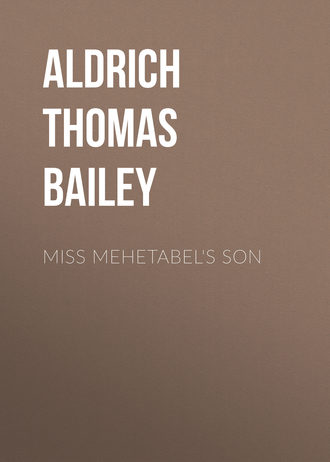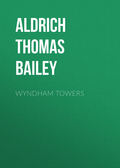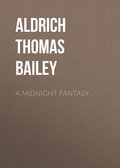
Aldrich Thomas Bailey
Miss Mehetabel's Son
“Hush!” whispered Mr. Jaffrey, with a deprecating motion of his hand. “Andy’s asleep!”
He rose softly from the chair and, walking across the room on tiptoe, drew down the shade at the window through which the moonlight was streaming. Then he returned to his seat, and remained gazing with half-closed eyes into the dropping embers.
I refilled my pipe and smoked in profound silence, wondering what would come next.
But nothing came next. Mr. Jaffrey had fallen into so brown a study that, a quarter of an hour afterwards, when I wished him good-night and withdrew, I do not think he noticed my departure.
I am not what is called a man of imagination; it is my habit to exclude most things not capable of mathematical demonstration; but I am not without a certain psychological insight, and I think I understood Mr. Jaffrey’s case. I could easily understand how a man with an unhealthy, sensitive nature, overwhelmed by sudden calamity, might take refuge in some forlorn place like this old tavern, and dream his life away. To such a man—brooding forever on what might have been and dwelling wholly in the realm of his fancies—the actual world might indeed become as a dream, and nothing seem real but his illusions. I dare say that thirteen years of Bayley’s Four-Corners would have its effect upon me; though instead of conjuring up golden-haired children of the Madonna, I should probably see gnomes and kobolds, and goblins engaged in hoisting false signals and misplacing switches for midnight express trains.
“No doubt,” I said to myself that night, as I lay in bed, thinking over the matter, “this once possible but now impossible child is a great comfort to the old gentleman—a greater comfort, perhaps, than a real son would be. Maybe Andy will vanish with the shades and mists of night, he’s such an unsubstantial infant; but if he does n’t, and Mr. Jaffrey finds pleasure in talking to me about his son, I shall humor the old fellow. It would n’t be a Christian act to knock over his harmless fancy.”
I was very impatient to see if Mr. Jaffrey’s illusion would stand the test of daylight. It did. Elkanah Elkins Andrew Jackson Jaffrey was, so to speak, alive and kicking the next morning. On taking his seat at the breakfast-table, Mr. Jaffrey whispered to me that Andy had had a comfortable night.
“Silas!” said Mr. Sewell, sharply, “what are you whispering about?”
Mr. Sewell was in an ill-humor; perhaps he was jealous because I had passed the evening in Mr. Jaffrey’s room; but surely Mr. Sewell could not expect his boarders to go to bed at eight o’clock every night, as he did. From time to time during the meal Mr. Sewell regarded me unkindly out of the corner of his eye, and in helping me to the parsnips he poniarded them with quite a suggestive air. All this, however, did not prevent me from repairing to the door of Mr. Jaffrey’s snuggery when night came.
“Well, Mr. Jaffrey, how ‘s Andy this evening?”
“Got a tooth!” cried Mr. Jaffrey, vivaciously.
“No!”
“Yes, he has! Just through. Gave the nurse a silver dollar. Standing reward for first tooth.”
It was on the tip of my tongue to express surprise that an infant a day old should cut a tooth, when I suddenly recollected that Richard III. was born with teeth. Feeling myself to be on unfamiliar ground, I suppressed my criticism. It was well I did so, for in the next breath I was advised that half a year had elapsed since the previous evening.
“Andy ‘s had a hard six months of it,” said Mr. Jaffrey, with the well-known narrative air of fathers. “We ‘ve brought him up by hand. His grandfather, by the way, was brought up by the bottle”—and brought down by it, too, I added mentally, recalling Mr. Sewell’s account of the old gentleman’s tragic end.
Mr. Jaffrey then went on to give me a history of Andy’s first six months, omitting no detail however insignificant or irrelevant. This history I would in turn inflict upon the reader, if I were only certain that he is one of those dreadful parents who, under the aegis of friendship, bore you at a streets corner with that remarkable thing which Freddy said the other day, and insist on singing to you, at an evening parly, the Iliad of Tommy’s woes.
But to inflict this enfantillage upon the unmarried reader would be an act of wanton cruelty. So I pass over that part of Andy’s biography, and, for the same reason, make no record of the next four or five interviews I had with Mr. Jaffrey. It will be sufficient to state that Andy glided from extreme infancy to early youth with astonishing celerity—at the rate of one year per night, if I remember correctly; and—must I confess it?—before the week came to an end, this invisible hobgoblin of a boy was only little less of a reality to me than to Mr. Jaffrey.
At first I had lent myself to the old dreamer’s whim with a keen perception of the humor of the thing; but by and by I found that I was talking and thinking of Miss Mehetabel’s son as though he were a veritable personage. Mr. Jafifrey spoke of the child with such an air of conviction!—as if Andy were playing among his toys in the next room, or making mud-pies down in the yard. In these conversations, it should be observed, the child was never supposed to be present, except on that single occasion when Mr. Jafifrey leaned over the cradle. After one of our séances I would lie awake until the small hours, thinking of the boy, and then fall asleep only to have indigestible dreams about him. Through the day, and sometimes in the midst of complicated calculations, I would catch myself wondering what Andy was up to now! There was no shaking him off; he became an inseparable nightmare to me; and I felt that if I remained much longer at Bayley’s Four-Corners I should turn into just such another bald-headed, mild-eyed visionary as Silas Jaffrey.
Then the tavern was a grewsome old shell any way, full of unaccountable noises after dark—rustlings of garments along unfrequented passages, and stealthy footfalls in unoccupied chambers overhead. I never knew of an old house without these mysterious noises. Next to my bedroom was a musty, dismantled apartment, in one corner of which, leaning against the wainscot, was a crippled mangle, with its iron crank tilted in the air like the elbow of the late Mr. Clem Jaffrey. Sometimes,
“In the dead vast and middle of the night,”
I used to hear sounds as if some one were turning that rusty crank on the sly. This occurred only on particularly cold nights, and I conceived the uncomfortable idea that it was the thin family ghosts, from the neglected graveyard in the cornfield, keeping themselves warm by running each other through the mangle. There was a haunted air about the whole place that made it easy for me to believe in the existence of a phantasm like Miss Mehetabel’s son, who, after all, was less unearthly than Mr. Jaffrey himself, and seemed more properly an inhabitant of this globe than the toothless ogre who kept the inn, not to mention the silent Witch of Endor that cooked our meals for us over the bar-room fire.
In spite of the scowls and winks bestowed upon me by Mr. Sewell, who let slip no opportunity to testify his disapprobation of the intimacy, Mr. Jaffrey and I spent all our evenings together—those long autumnal evenings, through the length of which he talked about the boy, laying out his path in life and hedging the path with roses. He should be sent to the High School at Portsmouth, and then to college; he should be educated like a gentleman, Andy.
“When the old man dies,” remarked Mr. Jaffrey one night, rubbing his hands gleefully, as if it were a great joke, “Andy will find that the old man has left him a pretty plum.”
“What do you think of having Andy enter West Point, when he ‘s old enough?” said Mr. Jaffrey on another occasion. “He need n’t necessarily go into the army when he graduates; he can become a civil engineer.”







